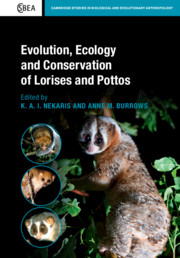Book contents
- Evolution, Ecology and Conservation of Lorises and Pottos
- Cambridge Studies in Biological and Evolutionary Anthropology
- Evolution, Ecology and Conservation of Lorises and Pottos
- Copyright page
- Dedication
- Contents
- Contributors
- Foreword
- Acknowledgements
- 1 Introduction
- Part I Evolution, Morphology and the Fossil Record
- 2 Sluggards and Drunkards?
- 3 What We Know (and Don’t Know) About the Fossil Records of Lorisids
- 4 Outliers
- 5 Molecular Advances in Lorisid Taxonomy and Phylogeny
- 6 The Toothcomb of Karanisia clarki
- 7 The Soft-Tissue Anatomy of the Highly Derived Hand of Perodicticus Relative to the More Generalised Nycticebus
- 8 Making Scents of Olfactory Sensitivity in Lorises and Pottos
- 9 Allometric and Phylogenetic Diversity in Lorisiform Orbit Orientation
- 10 The Evolution of Social Organisation in Lorisiformes
- 11 Biomechanics of Loris Locomotion
- 12 What Role Did Gum-Feeding Play in the Evolution of the Lorises?
- Part II Ecology and Captive Management
- Part III Research, Trade and Conservation
- References
- Index
2 - Sluggards and Drunkards?
A History of the Discovery and Description of the Afro-Asian Lorisidae
from Part I - Evolution, Morphology and the Fossil Record
Published online by Cambridge University Press: 29 February 2020
- Evolution, Ecology and Conservation of Lorises and Pottos
- Cambridge Studies in Biological and Evolutionary Anthropology
- Evolution, Ecology and Conservation of Lorises and Pottos
- Copyright page
- Dedication
- Contents
- Contributors
- Foreword
- Acknowledgements
- 1 Introduction
- Part I Evolution, Morphology and the Fossil Record
- 2 Sluggards and Drunkards?
- 3 What We Know (and Don’t Know) About the Fossil Records of Lorisids
- 4 Outliers
- 5 Molecular Advances in Lorisid Taxonomy and Phylogeny
- 6 The Toothcomb of Karanisia clarki
- 7 The Soft-Tissue Anatomy of the Highly Derived Hand of Perodicticus Relative to the More Generalised Nycticebus
- 8 Making Scents of Olfactory Sensitivity in Lorises and Pottos
- 9 Allometric and Phylogenetic Diversity in Lorisiform Orbit Orientation
- 10 The Evolution of Social Organisation in Lorisiformes
- 11 Biomechanics of Loris Locomotion
- 12 What Role Did Gum-Feeding Play in the Evolution of the Lorises?
- Part II Ecology and Captive Management
- Part III Research, Trade and Conservation
- References
- Index
Summary
The superfamily Lorisoidea comprises two families: the Galagidae (galagos or bushbabies) and the Lorisidae (lorises and pottos) (International Board of Zoological Nomenclature, 2002). The families share nocturnal, arboreal lifestyles; a diet of small animals, fruits, nectar and sometimes tree exudates; and a dispersed form of sociality. However, they differ markedly in their manner of moving within their habitats. Galagids and lorisids can be thought of as ‘leapers’ and ‘creepers’, respectively. Galagos are active hunters of insects. All extant galagid species have elongated tarsal bones that enable them to perform a degree of leaping, although some species are capable of more extensive leaps than others. The lorises and pottos, by contrast, have tarsal bones that appear to have been secondarily shortened, and twisted in the process (Gebo, 1989). Their femora and tibiae are also rotated along their longitudinal axes (Gebo, 2014). For much of the time, lorisids move slowly over short distances – although they are capable of unexpected bursts of speed, particularly when hunting or when threatened (Vosmaer, 1770). The first European author to describe a lorisid – or indeed any lorisoid primate – was Willem Bosman, a trader for the Dutch West India Company, who lived for 14 years (1688–1702) on the Guinea Coast in the region now called Ghana. Bosman was not a scientist but a merchant, and while his record of the West African potto (Perodicticus potto potto) does not meet the requirements of a scientific description, it captured attention. Bosman wrote that, although the local Africans referred to the animal as ‘potto’ (1705: 250). As if laziness were not enough to condemn them, pottos also had a reputation for drunkenness. Wilhelm Peters (1876), the curator of the Museum für Naturkunde in Berlin, quoted one of his collectors, Dr Rheinhold Buchholz, as recounting an African tale that pottos seek out palm wine, and drink so much from the gourds hanging from the trees that they fall into a deep sleep. Buchholz did not believe this story; his captive potto did not accept fresh palm wine.
- Type
- Chapter
- Information
- Publisher: Cambridge University PressPrint publication year: 2020



